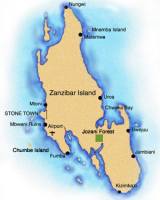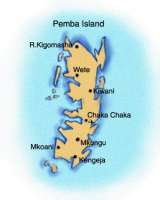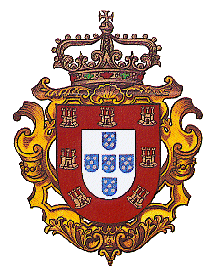|
|
A Portuguese
interlude: 16th - 17th century AD
|
|
The
small tropical island of Zanzibar, a mere twenty
miles off the east coast of Africa, has played a
part in local history out of all proportion to its
size. The reason is its easy access to traders and
adventurers exploring down the east coast of Africa
from Arabia.
Islam is well established in this region by the
11th century.

During the 16th century there is a new category of
visitor arriving from the south - the
Portuguese. They establish friendly relations
with the ruler. By the end of the century there is a
Portuguese trading station and a mission run by
Augustinian friars. But in the late 17th century
the Christian presence comes to an end, after a
forceful campaign down the coast by the Muslims of
 Oman. Oman.
By the late 1800's they surrendered
their last East African holding, Mombassa, which is
on the coast of present day Kenya. There are few
remnants of Portuguese rule over Zanzibar. Amongst
these are bullfights which are held on Pemba island
and a few Swahili words.
1500-1800 The Portuguese.
Christianity was first introduced
to Zanzibar by the Portuguese. Moving up the from
the south after successfully rounding the Cape of
Good Hope in 1488 they staged a violent and
ultimately unsuccessful bid to lay claim to the
harbors, trading routes and resources of almost 2000
miles of African coastline.
Reaching Zanzibar in 1499 the Portuguese
soon established a Catholic Mission and
trading station in Zanzibar Town. For the next 200
years they dominated the shipping lanes of East
Africa and strived to establish a string of coastal
settlements. Ruins of Portuguese settlements can
still be found near Fukuchani in the north
and on Pemba Island. The Fortress that stands today
near the harbor in Zanzibar City was built overtop
of an earlier catholic chapel located there; after
it was captured by Omani forces. These forces are
said to have been invited to Zanzibar and Pemba by
the islanders to help drive out the overbearing
Portuguese.
After decades of warfare and
destruction that saw Mombasa set afire, captured or
recaptured at least five times, the Portuguese
retreated from Azania. Back south they went, out of
reach of the incessant attacks born by the seasonal
Dhow winds.
|
Zanzibari cuisine owes its unique flavors to a variety of
cultures including Africans from the mainland, Arabs,
Portuguese, Indians, British, Chinese, and Americans. Eating
in Zanzibar is therefore like sampling a piece of the
island's history. To give you a better understanding of
where the various cooking techniques, spices, and flavors
originated, following is a brief view of the island's
history as viewed through a culinary lens.
http://www.zanzinet.org/zanzibar/people/people.html
http://home.globalfrontiers.com/Zanzibar/zanzibar_christians.htm
|
ADICIONAR SITE SITE


|